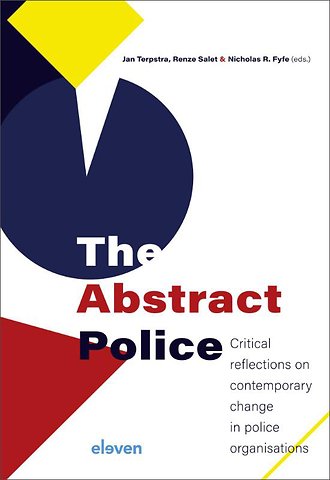

Jan Terpstra is professor emeritus at the Radboud University of Nijmegen, the Netherlands, and fellow at the Free University of Brussels (Research Group Crime & Society), Belgium.
Meer over de auteursThe Abstract Police
Critical reflections on contemporary change in police organisations
Gebonden Engels 2022 1e druk 9789462362642Samenvatting
Over the past ten to fifteen years the police in many Western European countries have undergone a series of profound organisational changes. The police now appear to operate at a greater distance from citizens, they are more impersonal and decontextualized and have become more dependent on digitalised data systems.
These changes are captured through the concept of the ‘abstract police’ and in this international collection of essays, leading policing scholars use this concept to make sense of contemporary changes to police organisations.
Drawing on empirical evidence from a wide range of policing contexts, the individual chapters address major questions about current developments in policing:
How are police organisations being shaped by the social, cultural, technological and political contexts in which they operate?
How does the concept of the abstract police help understanding of the complex interplay between change and continuity in policing?
Is the emergence of an abstract police the unintended outcome of processes of rationalization or a deliberate response to the new complexities of late modernity?
Trefwoorden
abstract police politieorganisatie organisatieverandering digitalisering politietechnologie politiehervorming community policing politiecultuur recherchewerk professionalisme vertrouwen legitimiteit procedural justice big data informatietechnologie politiewetenschap centralisatie rationalisering bureaucratie fragmentatie modernisering schaalvergroting specialisatie surveillance europa eerwraak schotland nederland
Trefwoorden
Specificaties
Lezersrecensies
Over Renze Salet
Over Nicholas Fyfe
Inhoudsopgave
U kunt van deze inhoudsopgave een PDF downloaden
Jan Terpstra, Nicholas R. Fyfe & Renze Salet
1.1 Abstract Police: The Concept 2
1.2 Main Questions and Topics 5
1.3 The Chapters of the Book 8
1.4 References 12
2 The Abstract Police and Occupational Culture 15
Michael Rowe, Liam Ralph, Andrew Millie & Matthew Jones
2.1 Introduction 15
2.2 Abstract Police and Occupational Culture 16
2.3 Methodology 18
2.4 Findings 18
2.5 Job-To-Job-To-Job 19
2.6 The Physical Working Environment 21
2.7 Single-Crewed Deployment 24
2.8 Technology 26
2.9 The Police Family and Abstract Police 28
2.10 Discussion and Conclusion 31
2.11 References 32
3 AbstractPolice andPolice ‘Professionalism’:ContemporaryContradictions in British Policing 35
Tom Cockcroft & Jacques de Maillard
3.1 Introduction 35
3.2 The Reconfiguration of Public Sector and State Relations 36
3.3 Education, the New Professionalisation Agenda and the Dominance of Organisational/Managerial Values 38
3.4 Increased Monitoring and Internal Negotiations in British Police Organisations 41
3.5 Discussion and Conclusion 49
3.6 References 52
4 Reform and Emergent Police Practice in Scotland: In Search of Situated Policing 57
Alistair Henry & Nicholas R. Fyfe
4.1 Introduction 57
4.2 Police Reforms as Particular Institutional Designs 58
4.3 Designing Police Scotland: The Possibilities of Enhanced Efficiency, Equity and Engagement 61
4.4 Abstract Policing and Situated Practice: Probing Tensions Between the Designed and the Emergent 63
4.5 Police Reform in Scotland: Towards the Abstract Police? 66
4.6 Discussion and Conclusions 72
4.7 References 76
5 Community Policing in the Age of Abstract Police 81
Jan Terpstra & Renze Salet
5.1 Abstract Police 82
5.2 Community Policing in the Netherlands 83
5.3 Internal Relations 85
5.4 Relations with Communities, Citizens and Partner Agencies 88
5.5 Digitalisation 90
5.6 Abstract Police and Strategies of Community Officers 93
5.7 Concluding Remarks 95
5.8 References 97
6 Investigating at a Distance: Abstractness in Detective Work 103
Helene O.I. Gundhus, Niri Talberg & Christin Thea Wathne
6.1 Introduction 103
6.2 Contextualising Informationalised Investigation 104
6.3 Centralisation and the Alienating Effect 109
6.4 Specialisation and the Fragmentation of Work Processes 117
6.5 Digitalisation, Standardisation and Discretion 120
6.6 Discussion and Concluding Remarks 123
6.7 References 125
7 Risks of Abstractness in Policing Honour-Based Violence 131
Janine Janssen
7.1 The Tank Case 131
7.2 What Is Honour-Based Violence? 133
7.3 Dutch Police and Honour-Based Violence 134
7.4 The Abstract Police and Honour-Based Violence 138
7.5 Finally: Is This (Good) Police Work? 145
7.6 References 146
8 An Assessment of Police Technology and the ‘Iron Cage’ of the Abstract Police in the United States 151
James J. Willis, Christopher S. Koper & Cynthia Lum
8.1 The Police and Information Technology 152
8.2 The Impact of Information Technology on Policing 154
8.3 Accountability and Management 155
8.4 Internal and External Communication and Relationships 157
8.5 Police Discretion 160
8.6 Conclusion 161
8.7 References 163
9 Good Policing in Times of Abstract Police 169
Kai Seidensticker & Felix Bode
9.1 Introduction 169
9.2 Tasks and Aims of Police Forces 170
9.3 Going Abstract 173
9.4 Going More Abstract in Times of Big Data 173
9.5 Consequences of Increasing Abstractness 175
9.6 Good Policing in Times of Abstract Police 178
9.7 Concluding Remarks 179
9.8 References 180
10 Canadian Reflections on ‘the Abstract Police’ 183
James Sheptycki
10.1 Introduction 183
10.2 The Abstract Police – An Inventory of Symptoms in Canada 186
10.3 What Is to Be Done About the Abstract Police? 197
10.4 Concluding Thoughts 198
10.5 References 200
11 ‘Virtual Policing’, Trust and Legitimacy 213
Ben Bradford, Elizabeth Aston, Megan O’Neill & Helen Wells
11.1 Introduction: Technology Shift and the Abstract Police 213
11.2 Sources of Trust and Legitimacy 217
11.3 Procedural Justice in Interactions Between Police and Public 218
11.4 Possible Futures in a World of Technologically Mediated Police Contact 222
11.5 Mitigating the Impact of Technologically Mediated Contact on Police Legitimacy 229
11.6 References 231
Contributors 239
Anderen die dit boek kochten, kochten ook
Rubrieken
- advisering
- algemeen management
- coaching en trainen
- communicatie en media
- economie
- financieel management
- inkoop en logistiek
- internet en social media
- it-management / ict
- juridisch
- leiderschap
- marketing
- mens en maatschappij
- non-profit
- ondernemen
- organisatiekunde
- personal finance
- personeelsmanagement
- persoonlijke effectiviteit
- projectmanagement
- psychologie
- reclame en verkoop
- strategisch management
- verandermanagement
- werk en loopbaan





